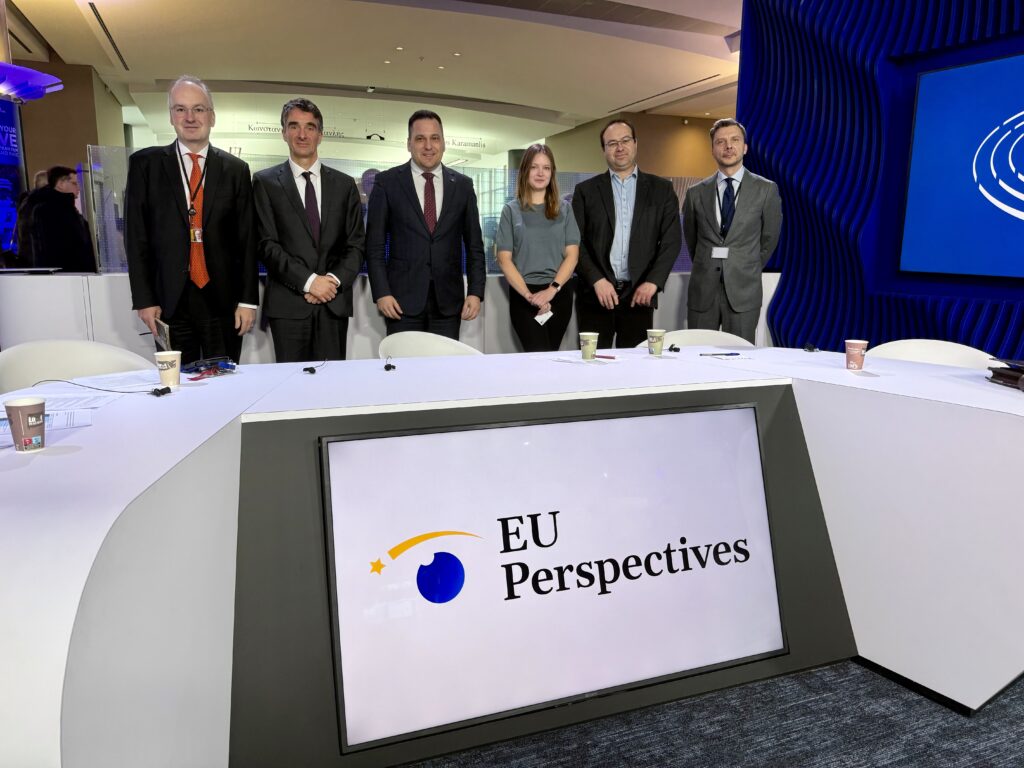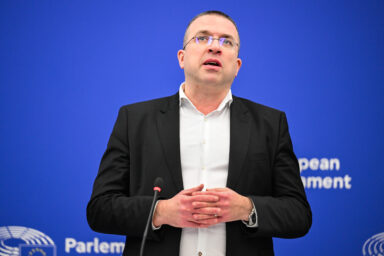If the EU members states cannot agree how to increase their contributions to the common budget, other ways must be found. Melchior Szczepanik, head of the Brussels office of the Polish Institute of International Affairs, floated some traditional – and some controversial – ideas as to what such ways might entail in a EU Perspectives podcast on 29 January in a debate with both fellow experts and a European Parliament representative.
Say that the massive projects envisioned by the new European Commission will require unprecedented levels of investment, and you are sure to find broad consensus among the policy stakeholders. Say that the money must be found even if it is politically difficult, and you will see plenty of nods around the room. But when it comes to the specific ways of generating the funds, you will be hard pressed to see two people in agreement.
In the most recent podcast by the news portal EU Perspectives, Melchior Szczepanik of the Polish Institute of International Affairs presented his ideas about the various strategies needed to accumulate the funds. But none of them offered any plain sailing – not in the podcast itself, let alone on the European Union’s decision-making scene.
The old and the new
“The idea of a policy based budget needs some clarification,” Mr Szczepanik embarked on the perilous journey. “The way I understand (the mission letter by the EC President, Ursula von der Leyen) is that the EU budget should be more connected to key priorities of the European Union. This was emphasized by Mario Draghi in his recent report on competitiveness. He highlighted the fact that in his view, the EU doesn’t spend enough on its priorities. And here we come back to this dilemma between financing the the new recently emerged priorities, such as defence, and financing traditional policies, to which a number of member states are very attached and not very keen on reducing.”
Mr Szczepanik, who hails form Poland, is well aware of the implications. “One of the reasons the European Union is so popular in Poland is that the people can see what the EU is doing for them,” he uttered what may be heard as a veiled warning against the EU abandoning its current spending priorities.
You might be interested
The idea of simply boosting the EU budget through increased contributions from the member states does not elicit much enthusiasm, either. “At the moment, things don’t look very promising, because the European Commission has already proposed a number of resources which the member states are not able to agree on,” the lifetime foreign policy analyst said. “For example, the European Commission suggested that the money that the member states’ governments receive from the Emission Trading Scheme should in part be directed to the EU budget.”
As expected, this does not go down very well with many member states, including Poland, he explained. “(They claim that) it is simply taking the money that would otherwise be used by the governments to implement reforms related to the Green Deal and moving it to the new budget. So it’s nothing new, it’s just moving money from one packet to another,” Mr Szczepanik argued.

Tax the rich
“I think that a more promising idea is taxing the the largest multinational companies, and the European Commission suggested that, too. Most of these companies, who do business in the European Union, pay taxes not commensurate with their revenue. They benefit from the single markets. Their revenues are considerable. So it is, I think, reasonable to request them to contribute to the EU budget,” the analyst suggested.
Mr Szczepanik, whose doctoral thesis at UK’s Loughborough University discussed the socialization of Polish Members of the European Parliament, knew full well that he was stepping into a minefield. “The member states are not willing to coordinate their tax policies a lot. They protect their freedom to decide about taxes. But I’m relatively hopeful that perhaps the taxes paid by the large multinational companies could in part go to the EU budget,” he pondered.
At the same time, he remained a realist. “There is a certain obstacle here that quite a number of these companies are based in the United States. Of course, the new US president is not keen on this idea,” Mr Szczepanik used a eufemism to describe the position on the matter of Donald Trump, whom he termed “dealmaker in chief”.
He acknowledged, however, that no deal will be easy. “The Commission said that if we don’t have bigger contributions, if we don’t have new own resources, then it will be difficult to have a budget that corresponds to our ambitions. Perhaps the Member States will be invited to increase their their rate of cofinancing, which will liberate some money for other priorities,” Mr Szczepanik appeared, for a moment, to resort to hopefulness.
Joint European debt
Then he fired a volley. “I think the member states should seriously consider joint borrowing again. A Polish think tank called Institute for Green Economy presented an idea for the EU Competitiveness Fund created through joint borrowing. This should be an off-budget mechanism; this way, we wouldn’t have to wait with this fund for the next Multiannual Financial Framework.”
Joint borrowing, however, has historically been anathema to more frugal member state governments, above all Germany. Other people are even sceptical towards borrowing in more general terms. Tomáš Zdechovský, an MEP for the European People’s Party who participated in the podcast, is one of them. “Would I support the idea of more common European debt? Not really. This is something what socialists, the greens, and communists have promoted here, and I am strongly against it,” he retorted in apparent dismay.
“This is always a stupid idea. Normally in your house, in your home, in your family, you don’t use debt all the time, only for investment, for strategic projects. And I don’t see any strategic project here,” Mr Zdechovský voiced his disapproval emphatically.
To a degree, the Czech MEP’s position found support in the views of another participant of the podcast, Zsolt Darvas, economist at the prestigious Bruegel think-tank. “To bring some controversy – I very much agree with you on some things. That increased spending should, indeed, be spent on investment. And for example, you mentioned the European Air Defense Shield; then I think there is a case for for for borrowing. There are lots of discussions about having a separate defense Fund, even possibly including the United Kingdom and and Norway. And if some countries like Hungary want to stay out, let them be. And again, I think funding that fund with borrowing would be sensible.”

The member states must decide
In response, Mr Szczepanik revisited his argument about the urgent need for joint borrowing on the grounds that “it will be very difficult to convince the member states to increase their national contributions to the EU budget.”
The prevailing tone of acquiescence to the perceived rampant self-interest of the national governments was then breached by a lone voice of dissent. It belonged to Andy Bounds, a veteran Financial Times EU correspondent. “Well, I think most member states have to decide what their priorities are. Tough choices are going to have to be made. A lot of governments are quite weak, they’re quite unstable, they’re coalitions. They fear losing power if they take tough decisions,” Mr Bounds found some sympathy with the governments’ predicament.
“But ultimately, leaders of the countries have to tell their public, you know, there’s a grave threat. We need to invest in defense, I’m going to close the hospital or whatever. I don’t know, I’m not a government. But these are the kind of tough challenges that government is about, right?” the journalist identified an underlying issue of the EU’s decision-making process.











